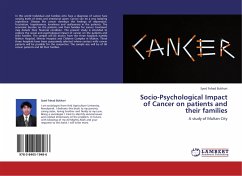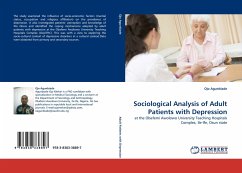New Challenges in Communication with Cancer Patients
Herausgegeben:Surbone, Antonella; Zwitter, Matjaz; Rajer, Mirjana; Stiefel, Richard
New Challenges in Communication with Cancer Patients
Herausgegeben:Surbone, Antonella; Zwitter, Matjaz; Rajer, Mirjana; Stiefel, Richard
- Broschiertes Buch
- Merkliste
- Auf die Merkliste
- Bewerten Bewerten
- Teilen
- Produkt teilen
- Produkterinnerung
- Produkterinnerung
The relationship between oncologists and their cancer patients is rapidly evolving. Oncologists and other cancer professionals master new anticancer and supportive treatment options, while working under increasing economic pressure and time constraints, and are often unprepared to deal with all the challenges of their new position in a therapeutic relationship with cancer patients and families. Good communication is as essential as are modern laboratory tests and sophisticated diagnostics to achieve the best clinical results.
This book updates the evolution of truth-telling and…mehr
Andere Kunden interessierten sich auch für
![Socio-Psychological Impact of Cancer on patients and their families Socio-Psychological Impact of Cancer on patients and their families]() Syed Fahad BukhariSocio-Psychological Impact of Cancer on patients and their families35,99 €
Syed Fahad BukhariSocio-Psychological Impact of Cancer on patients and their families35,99 €![Integrated Science Integrated Science]() Michael C. Shaw (ed.)Integrated Science35,99 €
Michael C. Shaw (ed.)Integrated Science35,99 €![Sociological Analysis of Adult Patients with Depression Sociological Analysis of Adult Patients with Depression]() Ojo AgunbiadeSociological Analysis of Adult Patients with Depression46,99 €
Ojo AgunbiadeSociological Analysis of Adult Patients with Depression46,99 €![Nurse Educator's Guide to Best Teaching Practice Nurse Educator's Guide to Best Teaching Practice]() Keeley C. HarmonNurse Educator's Guide to Best Teaching Practice57,99 €
Keeley C. HarmonNurse Educator's Guide to Best Teaching Practice57,99 €![Learning Trajectories, Innovation and Identity for Professional Development Learning Trajectories, Innovation and Identity for Professional Development]() Learning Trajectories, Innovation and Identity for Professional Development81,99 €
Learning Trajectories, Innovation and Identity for Professional Development81,99 €![International Handbook of Research in Medical Education International Handbook of Research in Medical Education]() International Handbook of Research in Medical Education416,99 €
International Handbook of Research in Medical Education416,99 €![Syndrome-based Approach to Diagnosis Syndrome-based Approach to Diagnosis]() Efim BenensonSyndrome-based Approach to Diagnosis97,99 €
Efim BenensonSyndrome-based Approach to Diagnosis97,99 €-
-
-
The relationship between oncologists and their cancer patients is rapidly evolving. Oncologists and other cancer professionals master new anticancer and supportive treatment options, while working under increasing economic pressure and time constraints, and are often unprepared to deal with all the challenges of their new position in a therapeutic relationship with cancer patients and families. Good communication is as essential as are modern laboratory tests and sophisticated diagnostics to achieve the best clinical results.
This book updates the evolution of truth-telling and communication patterns worldwide and offers insights into the recent trends and emerging challenges in communication with cancer patients and families. New Challenges in Communication with Cancer Patients is an invaluable resource to medical professionals, educators and patients in establishing a strong and effective partnership built on trust and mutual understanding.
This book updates the evolution of truth-telling and communication patterns worldwide and offers insights into the recent trends and emerging challenges in communication with cancer patients and families. New Challenges in Communication with Cancer Patients is an invaluable resource to medical professionals, educators and patients in establishing a strong and effective partnership built on trust and mutual understanding.
Produktdetails
- Produktdetails
- Verlag: Springer / Springer US / Springer, Berlin
- Artikelnr. des Verlages: 978-1-4899-8749-5
- 2013
- Seitenzahl: 552
- Erscheinungstermin: 20. September 2014
- Englisch
- Abmessung: 235mm x 155mm x 30mm
- Gewicht: 836g
- ISBN-13: 9781489987495
- ISBN-10: 1489987495
- Artikelnr.: 41532165
- Herstellerkennzeichnung Die Herstellerinformationen sind derzeit nicht verfügbar.
- Verlag: Springer / Springer US / Springer, Berlin
- Artikelnr. des Verlages: 978-1-4899-8749-5
- 2013
- Seitenzahl: 552
- Erscheinungstermin: 20. September 2014
- Englisch
- Abmessung: 235mm x 155mm x 30mm
- Gewicht: 836g
- ISBN-13: 9781489987495
- ISBN-10: 1489987495
- Artikelnr.: 41532165
- Herstellerkennzeichnung Die Herstellerinformationen sind derzeit nicht verfügbar.
Antonella Surbone is a medical oncologist working in Italy and the US. Together with Professor Zwitter and Richard Stiefel, she authored and edited the 1997 New York Academy of Sciences volume Communication with the Cancer Patient: Information and truth, which inspired her further work and this present book. Matjaz Zwitter is a radiation oncologist with a long-term interest in lung cancer, Hodgkin's disease, and medical ethics. In addition, he serves as Professor of Medical Ethics at the Medical School, University of Maribor, Slovenia. Mirjana Rajer is a medical oncology student at the Institute of Oncology, Ljubljana. She is involved in clinical research in lung cancer and conducts research in cancer-patient communication, with special emphasis on the impact of media and the Internet on patient-physician communication. Richard Stiefel first worked with Drs. Surbone and Zwitter during his twenty years as Associate Editor of the Annals of The New York Academy of Sciences. He has had a parallel career as Lecturer in Music Theory at Hunter College of the City University of New York.
1.From Truth Telling to Truth In the Making: A Paradigm Shift in Communication with Cancer Patients.- 2.Denial in Patient-Physician Communication Among Patients with Cancer. -3.Managing Uncertainty.- 4.Ethical Issues in Disclosing Bad News to Cancer Patients: Reflections of an Oncologist in Saudi Arabia.- 5.Psychological Challenges for the Oncology Clinician Who Has to Break Bad News.- 6.Dealing with Depression: Communicating with Cancer Patients and Grieving Relatives.- 7.Communication Issues in Integrative Oncology. -8.Communicating About Spiritual Issues with Cancer Patients.- 9.Understanding Perspective Transformation Among Recently Diagnosed Cancer Patients in Western India.- 10.In the Pursuit of Meaning: Cancer and the Family.- 11.The Patient's Personality as a Guide to Communication Strategy.- 12.Challenges to the Disclosure of Bad News to Cancer Patients in the Middle East: Saudi Arabia as an Example.- 13.Talking to a Child with Cancer: Learning from the Experience.- 14.Effective Communication with Older Cancer Patient.- 15."I Never Died Before..." End-of-Life Communication with Elderly Cancer Patients.- 16.Communication with Cancer Patients about Palliative and End-of-Life Care.- 17.Communication with Patients with Hereditary Cancer: Practical Considerations Focusing on Women's Cancers.- 18.Physician's Emotions in the Cancer Setting: A Basic Guide to Improving Well-Being and Doctor-Patient Communication.- 19.The Setting, The Truth and The Dimensions of Communication with Cancer Patients.- 20.Improving Communication Effectiveness in Oncology: The Role of Emotions.- 21.Binary Thinking: Hope and Realistic Expectations in Communication with Cancer Patients.- 22.A Physician's Personal Experiences as a Cancer-of-the-Neck Patient: Communication of Medical Errors to Cancer Patients and Their Families.- 23.Communication with Cancer Patients in Family Medicine.- 24.How to Train Teachers of Communication Skills: The Oncotalk Teach Model.-25.Communication Skills Training of Physicians in Portugal.- 26.Communication between Cancer Patients and Oncologists in Japan.- 27.Multicultural Aspects of Care for Cancer Patients in Israel.- 28.Cancer Diagnosis Disclosure: The French Experience.- 29.Communication with Patients with Hematological Malignancies in Argentina.- 30.Teaching Cultural Competent Communication with Diverse Ethnic Patients and Families.- 31.Breaking Bad News and Truth Disclosure in Australia.- 32.Defining the Possible Barriers to Communication with Cancer Patients: A Critical Perspective from Turkey.- 33.Cancer Disclosure, Health Related Quality of Life, and Psychological Distress: an Iranian Perspective.- 34.The Challenges in Communication with Cancer Patients in Contemporary Bosnia and Herzegovina Society.- 35.Evolution of Truth-Telling Practices of Brazil and South America.- 36.Communication with Cancer Patient in Russia: Improving Patients' Participation and Motivation.- 37.Communication with Cancer Patients in Zimbabwe.- 38.The Dialectics of the Production of Printed Educational Material for Cancer Patients: Developing Communication Prostheses.- 39. The Benefits and Pitfalls of the Internet in Communication with Cancer Patients.- 40.To Tell or Not To Tell - No More a Question!.- 41.Impact of the Internet and Economy on Cancer Communication in China.- 42.Communication with Patients in Clinical Research.- About the Authors.
1.From Truth Telling to Truth In the Making: A Paradigm Shift in Communication with Cancer Patients.- 2.Denial in Patient-Physician Communication Among Patients with Cancer. -3.Managing Uncertainty.- 4.Ethical Issues in Disclosing Bad News to Cancer Patients: Reflections of an Oncologist in Saudi Arabia.- 5.Psychological Challenges for the Oncology Clinician Who Has to Break Bad News.- 6.Dealing with Depression: Communicating with Cancer Patients and Grieving Relatives.- 7.Communication Issues in Integrative Oncology. -8.Communicating About Spiritual Issues with Cancer Patients.- 9.Understanding Perspective Transformation Among Recently Diagnosed Cancer Patients in Western India.- 10.In the Pursuit of Meaning: Cancer and the Family.- 11.The Patient's Personality as a Guide to Communication Strategy.- 12.Challenges to the Disclosure of Bad News to Cancer Patients in the Middle East: Saudi Arabia as an Example.- 13.Talking to a Child with Cancer: Learning from the Experience.- 14.Effective Communication with Older Cancer Patient.- 15."I Never Died Before..." End-of-Life Communication with Elderly Cancer Patients.- 16.Communication with Cancer Patients about Palliative and End-of-Life Care.- 17.Communication with Patients with Hereditary Cancer: Practical Considerations Focusing on Women's Cancers.- 18.Physician's Emotions in the Cancer Setting: A Basic Guide to Improving Well-Being and Doctor-Patient Communication.- 19.The Setting, The Truth and The Dimensions of Communication with Cancer Patients.- 20.Improving Communication Effectiveness in Oncology: The Role of Emotions.- 21.Binary Thinking: Hope and Realistic Expectations in Communication with Cancer Patients.- 22.A Physician's Personal Experiences as a Cancer-of-the-Neck Patient: Communication of Medical Errors to Cancer Patients and Their Families.- 23.Communication with Cancer Patients in Family Medicine.- 24.How to Train Teachers of Communication Skills: The Oncotalk Teach Model.-25.Communication Skills Training of Physicians in Portugal.- 26.Communication between Cancer Patients and Oncologists in Japan.- 27.Multicultural Aspects of Care for Cancer Patients in Israel.- 28.Cancer Diagnosis Disclosure: The French Experience.- 29.Communication with Patients with Hematological Malignancies in Argentina.- 30.Teaching Cultural Competent Communication with Diverse Ethnic Patients and Families.- 31.Breaking Bad News and Truth Disclosure in Australia.- 32.Defining the Possible Barriers to Communication with Cancer Patients: A Critical Perspective from Turkey.- 33.Cancer Disclosure, Health Related Quality of Life, and Psychological Distress: an Iranian Perspective.- 34.The Challenges in Communication with Cancer Patients in Contemporary Bosnia and Herzegovina Society.- 35.Evolution of Truth-Telling Practices of Brazil and South America.- 36.Communication with Cancer Patient in Russia: Improving Patients' Participation and Motivation.- 37.Communication with Cancer Patients in Zimbabwe.- 38.The Dialectics of the Production of Printed Educational Material for Cancer Patients: Developing Communication Prostheses.- 39. The Benefits and Pitfalls of the Internet in Communication with Cancer Patients.- 40.To Tell or Not To Tell - No More a Question!.- 41.Impact of the Internet and Economy on Cancer Communication in China.- 42.Communication with Patients in Clinical Research.- About the Authors.








